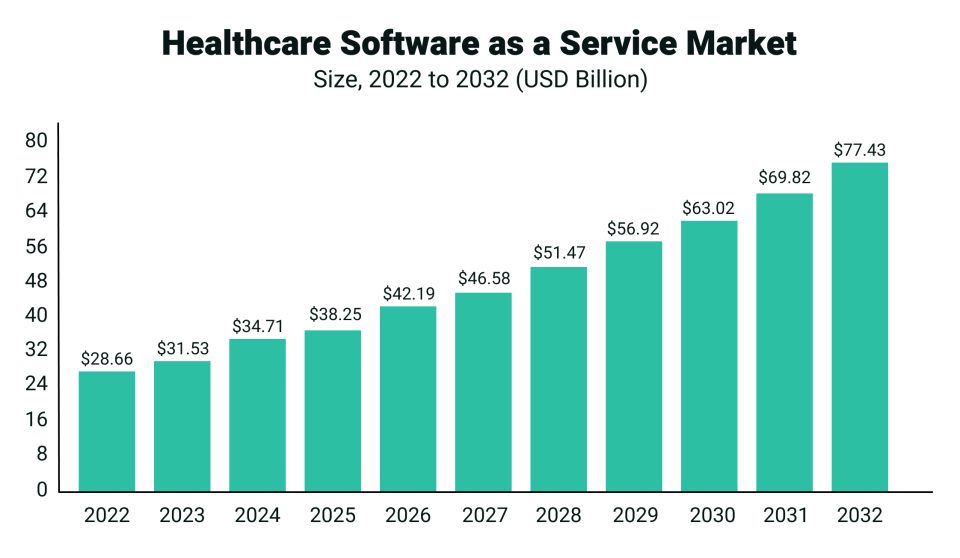INTRODUCTION
Custom solutions are essential for achieving the goals of value-based care
The healthcare industry is undergoing a fundamental transformation, driven by the shift from volume-based care to value-based care. This emerging model focuses on improving patient outcomes and reducing costs rather than simply increasing the number of procedures or services delivered. Value-based care aims to provide higher quality care while fostering sustainable healthcare systems by emphasizing preventive care, chronic disease management, and collaborative approaches. However, transitioning to this model requires healthcare organizations to adopt innovative tools and strategies to meet these ambitious goals.
Custom software solutions have emerged as indispensable tools for healthcare organizations striving to implement value-based care. These solutions can be tailored to meet providers' specific requirements, allowing them to effectively manage patient data, streamline workflows, and enhance care coordination. For example, custom analytics platforms can identify at-risk populations, monitor patient progress in real-time, and ensure adherence to evidence-based protocols. Such capabilities enable providers to focus on delivering personalized, proactive care that drives better patient outcomes and reduces costs.
In addition to enhancing patient care, custom software solutions support value-based care's operational and financial aspects. Robust systems can integrate seamlessly with electronic health records (EHRs) and other healthcare IT infrastructure, ensuring data accuracy and accessibility. They also enable tracking key performance indicators (KPIs), such as readmission rates and patient satisfaction scores, which are critical for meeting reimbursement criteria under value-based payment models. By providing actionable insights, custom software empowers organizations to optimize their processes and align with the demands of outcome-focused care.
Ultimately, custom software solutions offer healthcare organizations the flexibility and scalability needed to adapt to the evolving demands of value-based care. Off-the-shelf software often needs more adaptability to address the complexities of diverse patient populations and regulatory environments. In contrast, custom solutions are designed with a patient-centric approach, ensuring that every aspect—from user experience to interoperability—supports value-based care goals. With the right software in place, healthcare providers can meet their value-based care objectives and create a sustainable framework for continuous improvement in quality and efficiency.
IMPORTANCE
Transitioning to value-based care can elevate the quality of your healthcare practice
Value-based care is a healthcare delivery model prioritizing patient outcomes over the quantity of services provided. Unlike traditional fee-for-service models, which compensate providers based on the number of treatments or procedures, value-based care incentivizes healthcare organizations to focus on the quality, efficiency, and effectiveness of care. This approach fosters provider collaboration, encourages preventive care, and emphasizes the long-term health of patients rather than episodic treatment.
The importance of value-based care lies in its ability to address some of the most pressing challenges in modern healthcare. Rising costs, an aging population, and the increasing prevalence of chronic diseases have highlighted the limitations of volume-based care. Value-based care reduces financial strain on healthcare systems and enhances patient satisfaction by delivering personalized and holistic care. This model offers a sustainable pathway to improving the healthcare experience by aligning provider incentives with patient outcomes.
Key objectives of value-based care
Value-based care is centered on achieving three core objectives that benefit patients and improve the efficiency and sustainability of healthcare systems. These objectives are vital in transforming healthcare delivery and addressing contemporary challenges.
- Reducing costs: One of the primary goals of value-based care is to curb rising healthcare expenses while maintaining high-quality care. By emphasizing preventive measures such as early screenings, immunizations, and lifestyle interventions, healthcare organizations can mitigate the need for costly treatments and hospitalizations. Additionally, value-based care encourages efficient resource utilization by reducing duplicative tests and unnecessary procedures. The result is a healthcare system that prioritizes cost-effectiveness without compromising patient outcomes.
- Improving patient outcomes: Value-based care focuses on improving health by emphasizing evidence-based practices and care coordination. Providers are incentivized to monitor patients’ progress, manage chronic conditions, and ensure adherence to treatment plans. For example, coordinated care between specialists and primary care physicians ensures patients receive consistent and comprehensive treatment. This approach improves recovery rates, reduces complications, and improves patients' long-term health and well-being.
- Enhancing the patient experience: A critical aspect of value-based care is prioritizing the patient experience. This means fostering strong provider-patient relationships, offering personalized treatment plans, and ensuring patients feel engaged and informed throughout their care journey. Technology plays a key role in this objective, with tools like patient portals, telehealth services, and secure messaging enabling patients to participate actively in their care. By improving communication and transparency, value-based care builds trust and satisfaction, resulting in a more patient-centric healthcare system.
Together, these objectives make value-based care a transformative approach to modern healthcare. It addresses financial pressures, enhances patient satisfaction, and delivers meaningful health outcomes.
Are you tired of outdated systems holding your organization back?
CUSTOM SOFTWARE'S ROLE
Custom solutions are paving the way for a revolutionary shift in value-based care
Custom software is pivotal in helping healthcare organizations implement and excel within value-based care frameworks. Unlike generic solutions, custom software can be tailored to meet the unique needs of individual providers, aligning seamlessly with their workflows, patient populations, and care models. For instance, it can include specialized features such as predictive analytics for identifying high-risk patients, integrated tools for care coordination, and real-time reporting capabilities to track performance metrics. This level of customization ensures that healthcare organizations can address specific challenges and priorities, ultimately enhancing their ability to deliver patient-centered care.
One key advantage of custom software is its flexibility. As healthcare organizations evolve, so do their requirements, and custom solutions can easily adapt to these changes. Whether integrating with new technologies like wearable devices and remote monitoring tools or accommodating updates to regulatory requirements, custom software ensures healthcare providers remain agile and compliant. This adaptability is especially critical in value-based care, where success often hinges on responding to emerging trends, refining care delivery methods, and addressing gaps in patient engagement.
Custom healthcare software solutions also offer unparalleled scalability compared to off-the-shelf solutions. As healthcare organizations grow, they require systems capable of managing larger patient volumes, expanding data sets, and more complex operations. Custom solutions are designed with scalability in mind, ensuring that new functionalities, modules, or integrations can be added without disrupting existing workflows. This capability makes custom software an ideal choice for value-based care initiatives, where a provider’s capacity to scale efficiently can directly impact their ability to improve outcomes, reduce costs, and enhance the overall patient experience.

The global healthcare IT market is projected to grow exponentially over the years
SOFTWARE IMPACT
Custom software is setting the stage for a new era of value-based care
Custom software solutions are instrumental in driving value-based care by addressing the unique needs of healthcare organizations aiming to enhance patient outcomes and lower costs. Unlike generic off-the-shelf systems, custom software offers tailored functionality, seamless integration, and adaptability to meet specific organizational goals. These solutions enable providers to optimize patient data management, enhance care coordination, streamline operations, and monitor performance metrics effectively. Here are the key ways custom software solutions can improve value-based care.
Enhanced patient data management and analytics
Healthcare custom software development revolutionizes patient data management by enabling comprehensive data collection, seamless integration, and robust analytics. These tools centralize patient information from multiple sources, including electronic health records (EHRs), wearable devices, and diagnostic tools, ensuring that providers have a complete view of a patient’s health. Advanced analytics built into custom software can identify trends, predict health risks, and generate actionable insights, empowering healthcare providers to make informed, evidence-based decisions that drive better patient outcomes. Organizations can easily monitor metrics critical to achieving value-based care goals with tailored dashboards and reporting tools.
Interoperability and data security are key advantages of custom software in value-based care frameworks. By designing systems that integrate with existing healthcare IT infrastructure, such as EHRs, laboratory systems, and telehealth platforms, custom solutions ensure smooth information exchange among providers. This interoperability eliminates data silos, enhancing care coordination and patient outcomes. Additionally, custom software incorporates advanced security measures, such as encryption and role-based access controls, to protect sensitive health information. Compliance with standards like HIPAA and GDPR further reduces the risk of breaches, fostering trust among patients and providers.
Improved care coordination
Custom software development for healthcare enhances care coordination by facilitating seamless communication and collaboration among healthcare providers. It supports integrated workflows where primary care physicians, specialists, and other stakeholders can access and share patient data in real-time. Tools like patient portals enable patients to actively participate in their care, view their medical records, and communicate with their providers. Scheduling software ensures that appointments are efficiently managed across multiple providers, reducing delays and improving care continuity. Telehealth solutions extend this coordination by allowing providers to consult with patients and each other, irrespective of geographical boundaries.
Custom software promotes a patient-centric approach to healthcare delivery by unifying care teams through centralized platforms. For example, shared care plans and real-time notifications help ensure that all providers involved in a patient’s care are aligned on treatment goals and progress. This level of coordination minimizes the risk of errors or redundant treatments and improves the overall patient experience, making value-based care models more effective and sustainable.
Optimized operational efficiency and cost savings
Custom software streamlines administrative tasks, reduces redundancies, and automates workflows, significantly improving operational efficiency. Appointment scheduling software, for instance, minimizes no-shows by sending automated reminders to patients, while optimized billing systems simplify payment processing and reduce errors. Similarly, custom solutions for EHR management enhance data entry efficiency, ensuring that healthcare providers can focus more on patient care rather than administrative burdens. By automating routine tasks, these solutions free up valuable time and resources, driving down operational costs while maintaining high service standards.
The cost-saving potential of custom software extends beyond workflow optimization. For example, tools that analyze resource utilization can help healthcare organizations reduce waste, such as over-ordering supplies or underutilizing equipment. Predictive analytics can also help anticipate staffing needs, ensuring that providers are adequately staffed during peak times. These efficiencies are vital for value-based care models, where financial sustainability and quality improvements must go hand in hand.
Outcome-based performance monitoring
Custom software monitors and reports performance metrics that align with value-based care objectives. Tailored systems can track hospital readmission rates, patient satisfaction scores, and treatment adherence rates. These insights enable healthcare organizations to evaluate their performance against predefined quality and efficiency goals, identifying areas for improvement. Custom solutions can also automate the reporting process, ensuring compliance with regulatory requirements and value-based payment models while reducing the administrative burden on staff.
Performance monitoring through custom software reinforces value-based care principles by keeping healthcare organizations accountable for outcomes. Real-time feedback loops allow providers to make data-driven adjustments to care plans, enhancing their effectiveness. For instance, a decline in patient satisfaction scores might prompt providers to review communication strategies, while high readmission rates could highlight the need for better discharge planning. Custom software helps organizations improve long-term patient care and financial performance by continuously aligning operations with value-based care metrics.
OVERCOMING CHALLENGES
The road to value-based care is paved with challenges, but custom software holds the solutions
Implementing custom software in value-based care frameworks presents challenges, one of the most significant being integration with legacy systems. Many healthcare organizations rely on outdated IT infrastructure that needs more flexibility to communicate effectively with modern software solutions. This creates data silos, hampers interoperability, and undermines care coordination efforts. Overcoming this requires a phased approach, where custom software is designed with compatibility in mind, utilizing APIs to bridge gaps between old and new systems. Partnering with expert healthcare software developers ensures a seamless integration process while minimizing disruptions to daily operations.
Cost considerations are another major obstacle for healthcare providers. Engaging custom healthcare software development services involves upfront investment in design, development, and deployment, which can be daunting for organizations operating on tight budgets. However, the long-term benefits, such as operational efficiency, cost savings, and improved patient outcomes, often outweigh these initial expenses. Strategies like prioritizing high-impact features during development, opting for scalable solutions, and leveraging cloud-based technologies can help manage costs effectively. Working with experienced software developers who understand the value-based care landscape ensures that investments are aligned with organizational goals.
Regulatory compliance is a critical challenge in custom software development for value-based care. Ensuring that software adheres to complex and evolving regulations, such as HIPAA in the U.S. or GDPR in the EU, requires meticulous planning and expertise. Non-compliance can result in legal penalties and loss of patient trust. To address this, healthcare organizations should collaborate with software developers who are well-versed in healthcare regulations. Regular audits, robust security measures, and clear documentation throughout the development process are essential for maintaining compliance and safeguarding sensitive patient data.
Resistance to change and lack of technical expertise within healthcare organizations can also hinder the successful implementation of custom software. Staff may feel overwhelmed by new technologies, leading to underutilization or errors. Comprehensive training programs and ongoing support should be part of the implementation strategy to address this. Additionally, intuitive user interfaces and user-centric design can help reduce the learning curve and boost adoption rates. Partnering with developers who emphasize user experience and provide post-implementation support ensures that custom software is implemented successfully and used effectively to achieve value-based care objectives.
CONCLUSION
Custom software solutions may be the missing link to achieving sustainable success
Custom software solutions are transformative in advancing the success of value-based care initiatives. By addressing the specific needs of healthcare organizations, custom software enhances data management, care coordination, operational efficiency, and performance monitoring. These capabilities enable providers to deliver superior patient outcomes, reduce costs, and create a more patient-centered healthcare experience—key value-based care objectives. Additionally, custom solutions ensure seamless integration with existing systems, foster compliance with regulatory requirements and provide the flexibility to adapt to the ever-evolving healthcare landscape.
For healthcare organizations aiming to implement sustainable value-based care, tailored software is not just an advantage—it is essential. Off-the-shelf solutions often fail to address the unique complexities of individual providers. In contrast, custom software offers the scalability, adaptability, and precision needed to thrive in a value-driven environment. By investing in expert healthcare software development, organizations can overcome implementation challenges and unlock the full potential of value-based care, ensuring long-term success and improved healthcare delivery for all stakeholders.
People Also Ask (PAA) questions
- What is value-based care, and how does it differ from fee-for-service?
Value-based care focuses on improving patient outcomes while reducing costs by linking payments to care quality. In contrast, fee-for-service reimburses providers based on the quantity of services delivered, regardless of outcomes. - Why is value-based care important in healthcare?
Value-based care is essential for enhancing patient outcomes, reducing healthcare costs, and improving care efficiency. It focuses on preventive care and long-term wellness, benefiting patients and providers. - How can technology support value-based care?
Technology supports value-based care by enabling advanced data analytics, care coordination, telehealth, and performance monitoring. Custom software solutions streamline workflows, enhance patient engagement, and track outcomes effectively. - What are examples of value-based care models?
Examples include Accountable Care Organizations (ACOs), Patient-Centered Medical Homes (PCMHs), and bundled payment programs. These models incentivize providers to deliver high-quality, cost-efficient care. - How do custom software solutions help in patient data management?
Custom software centralizes and integrates patient data from multiple sources, ensuring seamless access and real-time updates. It also enhances data security and enables analytics for informed decision-making. - What are the main benefits of custom healthcare software?
Custom software offers scalability, flexibility, and tailored functionality to meet organizational needs. It improves efficiency, enhances patient outcomes, and ensures compliance with regulatory standards. - What is the role of data analytics in value-based care?
Data analytics identifies trends, predicts risks, and measures outcomes in value-based care. It provides actionable insights that help healthcare providers optimize care delivery and achieve cost savings. - How does custom software improve care coordination?
Custom software facilitates real-time data sharing, streamlined communication, and integrated workflows among healthcare providers. Tools like patient portals and scheduling systems ensure continuity of care and enhance patient experiences. - What are the challenges of implementing custom software in healthcare?
Challenges include high upfront costs, legacy system integration, and compliance with complex regulations. Addressing these requires expert developers, phased implementation, and ongoing support. - How can healthcare providers measure success in value-based care?
Providers can measure success using patient satisfaction scores, readmission rates, cost savings, and care quality benchmarks. Custom software aids in tracking and analyzing these metrics efficiently.






